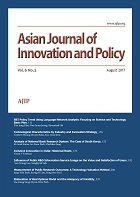 ISSN : 2287-1608
ISSN : 2287-1608
Vol.11 No.2
Abstract
This study analyzed changes in the national research facilities & equipment (RFE) policies historically promoted by the Rho administration (2003~2007), Lee administration (2008~2012), Park administration (2013~2016), and Moon administration (2017~2019) in South Korea. By adding new variables such as policy goals and policy means to a model suggested by Hogwood and Peters (1983), policy change types and their flow could be better classified. Korean RFE policies showed various flows in the policy change types instead of a general flow, which is the order of policy innovation -> policy innovation -> policy succession -> policy succession. This finding indicates that each administration could pursue a higher-level policy change purposively. It is highly required to prepare policy development that devotes to organizing and operating a national council, reflecting in the government's comprehensive plan after evaluating policy effectiveness, improving items needed for the RFE status survey, and unifying the research equipment registration.
Abstract
The purpose of this article is to provide preliminary findings on the state of digital technology applications of startups in Southeast Asia and to discuss issues related to digital health adoption in the region. This exploratory study is based on an empirical analysis of startups and digital technology applications information from various publicly available website databases. Public and private organizations would benefit from a better understanding of the current state of digital technology applications provided by startups and the challenges faced in digital health adoption. This article contributes to the existing literature by offering an overview of startups and digital technology applications in the digital health space in the fast-growing region of Southeast Asia. It offers advice to organizations intending to pursue healthtech initiatives on the types of health services provided by startups and issues that need to be addressed to increase the adoption rate.
Abstract
The media has depicted an abrupt socio-technological change in the Republic of Korea with the 4th Industrial Revolution. Because technologies cannot realize their potential without social acceptance, studying conflicts incurred by such a change is imperative. However, little literature has focused on conflicts caused by technologies. Therefore, the current study investigated media coverage regarding conflicts related to the 4th Industrial Revolution from 2016 to 2020 in the Republic of Korea, applying text-mining techniques. We found that the overall amount and coverage pattern conforms to the issue attention cycle. Also, the three major topics (“SMEs & Startups,” “Mobility Conflict,” and “Human & Technology”) indicate quarrels between conflicting social entities. Moreover, the temporal change in media coverage implies the political use of the term rather than technological. However, we also found the media’s deliberative discussion on the socio-technological impact. This study is significant because we expanded the discussion on media coverage of technologies to the realm of social conflicts. Furthermore, we explored the news articles of the recent five years with a text-mining approach that enhanced the objectivity of the research.
Abstract
As the COVID-19 pandemic crisis left developing countries with economic setbacks, it is high time to highlight that innovative technologies lead the digital economy. The big powers including the United States and China are already implementing industrial policies that involve large-scale fiscal expenditures to secure the lives and safety of their people. To prepare for the future up to 2025, this paper reflects opinions of industry-academia-research experts regarding changes in the external environment and industry trends. By reflecting results of focus group interviews and changes in the external environment and industry trends, a new high-level 5X strategy (Digital Transformation, Energy Transformation, Bio Health Transformation, Supply Chain Transformation, and Research Transformation) to solve national tasks required for the existing ten policy demand fields and ten agenda during lower-level policy implementation stages were derived.
Abstract
As the global epidemic continues to worsen, the pressure on the supply chain is also increasing. In this context, Internet shopping has ushered in new development opportunities. Under the influence of globalization, the development of cross-border e-commerce (CB-EC) is particularly remarkable. As China is a big manufacturing country, the growth of CB-EC is a significant opportunity for Chinese goods to enter the international market. Therefore, this paper comprehensively analyzes the current situation of the integrated development of China's manufacturing industry and CB-EC from four aspects: the operation mode, development mode, policy environment, and development prospect of CB-EC in China's manufacturing sector. This paper constructs an evaluation system including 19 secondary indicators to rank the CB-EC development environment of 30 provinces in China that have established comprehensive pilot zones of CB-EC.
Abstract
The historical aspects, policies, institutions, awards and measurement results of scientific literacy and scientific culture development in Indonesia have currently attracted further exploration. This paper utilizes secondary data research, further analyzed by employing the Supplementary Analysis technique. The results revealed that the tradition of writing and publishing scientific journals in Indonesia has existed ever since the Dutch East Indies with the journal's publication entitled 'Natuurkundig tijdschrift voor Nederlandsch Indië' in 1850. To date, Indonesia has owned 5,990 nationally accredited journals. Policy support has been provided at the national and regional levels, despite limitations in cultivating literacy and reading habit. From the institutional perspective, Indonesia provides a wide array of public support, including the effort of the Ministry of Education and Culture for advocating the national literacy movement and the availability of a reference database and scientific access established by the National Library; the Indonesian Institute of Sciences, and the Ministry of Research and Technology. Similarly, in the award-related perspective, the Indonesia government has granted awards to individuals or groups and local governments engaging in the cultivation of scientific literacy and scientific culture. However, among the global measurements for literacy development in Indonesia (in 2020) recorded that three indicators scored less than those in 2019.
